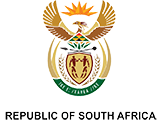Dear Fellow South African,
The three life sentences handed down to the rapist and killer of UCT student Uyinene Mrwetyana by the Cape High Court are befitting of this heinous crime. The life sentences serve the cause of justice and must act as a deterrent to men who rape and kill the women of our country.
We remain firm in our resolve that a life sentence must mean life. Those who commit crimes against women and children must know that they will be caught and tried, and that our courts will act firmly against those found guilty.
The pain we felt as a nation at the brutal killing of Uyinene, of Jesse Hess, of Leighandre Jegels, of Janika Mallo and of the many other slain women and children remains fresh. We dare not rest.
The violence perpetrated by men against women remains a scourge and national crisis that we must act urgently to end.
The Emergency Action Plan to deal with the scourge of gender based violence that I announced at a special joint sitting of Parliament in October is being implemented. The women of our country demanded that financial and other resources should be made available to address this national crisis. I directed that government should respond the call that had been made by the women of our country. The government has responded. The responsible government departments have together reprioritised R1.6 billion for the plan to be resourced and implemented.
The plan focuses on improving access to justice for survivors of violence and prevention campaigns to change attitudes and behaviour. It involves measures to strengthen the criminal justice process and to prioritise the creation of economic opportunities for women who are vulnerable to abuse.
I have directed that I be given weekly reports on the implementation of the plan. There has been notable progress on a number of aspects of the plan.
We are on track to achieve our target of establishing 11 more sexual offences courts by the end of the current financial year. A new Sexual Offences Court has been opened in Sibasa in Limpopo and eleven regional courts across all provinces have been identified for upgrade.
To protect the rights and dignity of child survivors and mentally disabled survivors, CCTV systems have been upgraded at 38 regional courts. Two weeks ago I opened the High Court in Mpumalanga and I was pleased to see that the court has the appropriate facilities to protect the rights and dignity of child survivors and mentally disabled survivors. Such facilities allow testimony to be given without having to face assailants in an open courtroom.
We are in the process of establishing three new Thuthuleza Care Centres centres in the Eastern Cape, KwaZulu-Natal and Gauteng. Provinces are identifying underutilised buildings that can be refurbished and used as shelters.
Clearing case backlogs is a priority. The National Prosecuting Authority is implementing a 100 day rapid results approach to speed up case turnaround times. Courts with significant backlogs in the North West, Eastern Cape and Limpopo have been identified for roll-out.
National and provincial 24-hour call centres to deal with complaints against police officials, prosecutors and magistrates on gender-based violence and femicide cases are now up and functioning. We are working to reduce the GBV case backlogs at forensic laboratories and are developing a tracking mechanism that will be rolled out in January 2020.
The SAPS has allocated 312 new recruits currently undergoing basic training to the Family Violence, Child Protection and Sexual Offences Units. To date, 7,000 rape evidence collection kits have been distributed to police stations across the country. A project to reopen unresolved murder and sexual offences cases (so-called cold cases) will soon be operational. It has already begun in the Eastern Cape.
Government employees who work with children and mentally disabled persons are being vetted against the National Register of Sex Offenders. To date, 1,222 officials have been vetted, including prosecutors and members of the SAPS.
Legislative reform is underway to tighten conditions around bail and sentencing for perpetrators of gender-based violence, as well as provisions that extend the protection afforded to women and children.
We are rolling out an education, awareness and prevention campaign on various media platforms. This includes providing information on how to access the Thuthuzela Care Centres and the gender-based violence command centre.
The women of our country are tired of living in fear. It is their rightful expectation that they should be protected from violence, and that perpetrators of such acts should be imprisoned.
I have taken personal responsibility to ensure the emergency plan is implemented, and I will provide our citizens with regular reports on our progress.
Gender-based violence is not a problem of the rich or the poor. It is not a problem of the townships or the suburbs or the villages. It impacts us all, and we have had enough of its deeply harmful effects: broken families, ravaged communities and lives destroyed.
Our success depends on the involvement of each South African. It is a responsibility none of us should abdicate. We must all get involved. Let us not look away.
Let us work together, in the words of the Freedom Charter, ‘sparing neither strength nor courage’ to eradicate this evil from our country.
With best wishes,
With best regards,

- Tags:
- Women /
- Gender-based violence /
- GBV /
- Crime /
- Murder /
- Sexual offences /
- Emergency action plan on GBV


